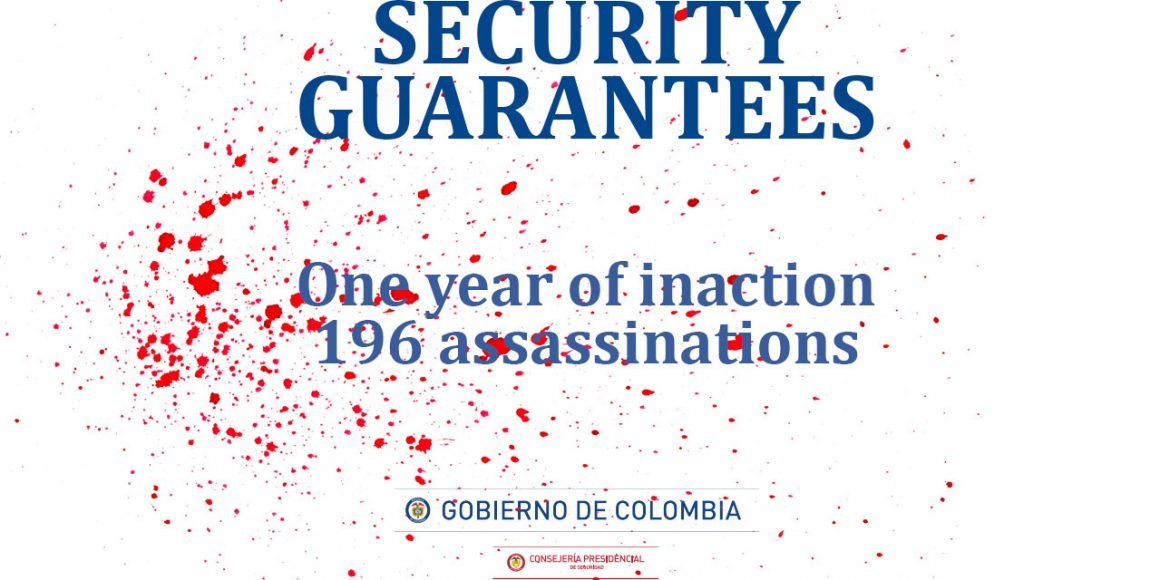Colombia’s President Ivan Duque has not once convened the commission in charge of reducing political violence in his country, according to the United Nations.
This became clear on Friday when the UN’s mission chief told the Security Council that the so-called National Commission on Security Guarantees “has not met for many months.”
The Subcommission of the National Commission on Security Guarantees recently met to receive inputs from civil society organizations, but we remain concerned that the Commission itself has not met for many months. Its mandate –the design and implementation of a public policy to dismantle criminal organizations– is essential to put a stop to these killings.
UN mission chief Carlos Ruiz
To be precise, the commission has not met since July 6 last year, one month before Duque’s inauguration.
Meanwhile, almost 1,000 human rights leaders, politicians and community leaders are suffering death threats, according to the Ombudsman. Almost 200 social leaders have been murdered between March 2018 and May this year, ombudsman Carlos Negret said Monday.
Why this commission is crucial to reduce political violence
According to the 2017 law that created the commission, the commission on security guarantees’ objective is “to design and follow up on public and criminal policy related to the dismantling of the criminal organizations and conducts responsible for homicides and massacres, that attack human rights defenders, social and political movements, or that threaten the people who take part in the implementation of the [peace] agreements and the construction of peace, including criminal organizations that have been denominated as successors of paramilitarism and its support networks.”
The same law ordered the prosecution to create a special investigation unit to investigate these “parapolitics” and “para-economics” structures and the ombudsman to create and alert system to that would allow a rapid response in the cases of threats.
This law came into place because the structures behind the far-right violence remained in tact despite the demobilization of paramilitary organization AUC by former President Alvaro Uribe, according to the AUC’s former political chief, Ivan Roberto Duque, a.k.a. “Roberto Baez.”
What happened was a demobilization of an armed wing of the paramilitary system, but as a political, social, economic, almost ‘cultural’ phenomenon it has not disappeared.
“If we want peace, we need two fundamental things: We must comply with the agreements… and we must intervene as soon as possible in the issue of the violence” of the AUC successor groups.
Half of Colombia’s Congress worked with paramilitaries: ex-AUC ideologue
In an interview with Spanish news agency EFE, Duque said earlier this month that it is “difficult” to protect individual citizens who assume leadership positions.
What Duque did not say was that this was foreseen by the FARC, former President Juan Manuel Santos and the AUC’s former political chief. Duque’s “difficulty” was exactly the reason why the commission, the prosecution unit and the alert system were created in the first place.
Duque’s increasingly evident conflict of interest
The problem is that is becoming increasingly evident that prominent members of Duque’s far-right party, the Democratic Center, are part of the criminal structures the government must dismantle.
Duque’s political patron, Alvaro Uribe, is investigated by the Supreme Court over the alleged tampering of witnesses who have testified that the former president and his family formed their own death squad.
The government’s land restitution chief was the representative of palm oil plantation owners when they were thrown in jail over their use of death squads to accumulate their land.
How to steal land the size of a small country and get away with it | Part II
It is also evident that some of these structures, particularly the Aguilas Negras, explicitly support Duque and Uribe, and will threaten or assassinate anyone opposing the president, his allies and his policies.
This became painfully evident early this month when the Inspector General suspended the mayor of Tierralta amid suspicions that his family was using the local government, the police and a death squad to protect the wealth they obtained through the illegal dispossession of land from displaced farmers.
Public safety vs. partisan interests
What is concerning the UN, electoral observers and think tanks is that Duque has not just refused to allow the development of policies to reduce political and economical violence, he has pushed through policies that endorsed violence in the past, much to the benefit of the political allies and economical backers that got him into power.
According to the independent Electoral Observation Mission (MOE), particularly the Aguilas Negras are impeding the political participation of movements other than Duque’s Democratic Center party. Violence ahead of October’s local elections is higher than in 2015 when the FARC was still in arms, according to the MOE.
Victim organizations, at the same time, have accused the government of using its Citizens’ Cooperation Network to intimidate rural communities that are critical of the government rather than increase safety.
Colombia’s conflict victims demand political representation and denounce repression
Other policies and military orders, like the arming of civilians and the allowance to collude with illegal armed groups to combat guerrillas, in the past have done nothing but inflate the so-called uribistas’ wealth and power while destroying public safety or dissuade violence in politics and economic activity.
None of these controversial policy and military directives have been approved by Congress, which like the UN has pushed Duque to implement the peace deal and in particular the National Commission for Security Guarantees.


